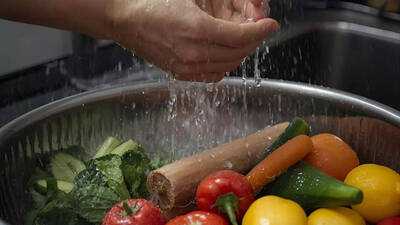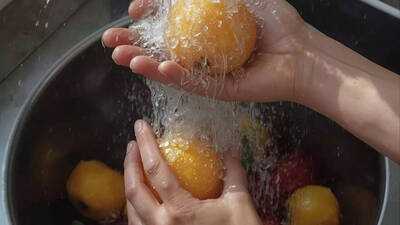Those shiny apples and crisp cucumbers at the market might look tempting, but beneath their fresh surface could lie traces of pesticides used to protect crops. These chemicals do not wash away easily, and simply rinsing produce under running water is not always enough. Fortunately, there is one simple trick that works far better, and it involves nothing more than a spoonful of baking soda.
A study published in the Journal of Agricultural and Food Chemistry found that soaking apples in a baking soda and water solution for around 12 to 15 minutes effectively removed surface pesticides more efficiently than plain water or commercial bleach solutions. This finding highlights that a basic kitchen ingredient like baking soda can significantly reduce chemical residues on fruits and vegetables, making them safer to eat.
Why washing fruits and vegetables properly matters
Pesticides are essential for modern farming, but consuming their residues over time can pose health risks. Research suggests that even low-level exposure may affect hormonal balance, fertility, and neurological function. Washing your produce correctly is therefore crucial, not just for hygiene but also for long-term wellbeing.
While most people rinse fruits and vegetables under tap water, that alone will not remove the oily film left by certain pesticide sprays. Baking soda, or sodium bicarbonate, offers a better alternative because of its mild alkalinity, which can break down and neutralise some of the most common chemical compounds found on produce surfaces.
How baking soda removes pesticides

Baking soda works through a process known as alkaline hydrolysis. Its high pH level helps degrade pesticide residues such as organophosphates and carbamates, which often cling stubbornly to fruit and vegetable skins. When dissolved in water, it forms a gentle cleaning solution that lifts away surface chemicals without damaging the produce.
The Journal of Agricultural and Food Chemistry study demonstrated that baking soda can penetrate the waxy layer on apples and neutralise certain pesticide molecules within minutes. It is an eco-friendly, affordable, and non-toxic method suitable for everyday kitchen use.
How to wash fruits and vegetables using baking soda
Here is the most effective way to clean your produce at home using this one trick:
This simple method helps eliminate most surface pesticides and dirt, giving you cleaner, safer fruits and vegetables.
Other natural cleaning alternatives

If you are out of baking soda, a few other natural options can also help reduce pesticide residue:
What not to do when washing produce
Avoid using soaps, detergents, or chemical cleaners. They can leave behind residues that are not safe for ingestion and can even react with the natural compounds in fruits and vegetables. Also, do not soak delicate items like berries for too long, as they may absorb too much water and lose flavour or texture.
This one simple baking soda trick can make a huge difference in your kitchen routine. Instead of relying on costly produce washes or chemical sprays, just add a spoonful of baking soda to water and let nature do the cleaning.
Not only does this method remove a significant portion of pesticide residues, but it also keeps your meals fresher, cleaner, and safer. The next time you bring home your groceries, skip the quick rinse and give them a baking soda bath instead to enjoy truly fresh food.
Disclaimer: This article is for general informational purposes only and is not a substitute for professional medical advice, diagnosis, or treatment. Always seek the guidance of a qualified healthcare provider regarding any medical condition or lifestyle change.
Also read| Chilli oil for health and flavour: Health benefits, cautions, and the right way to enjoy it
A study published in the Journal of Agricultural and Food Chemistry found that soaking apples in a baking soda and water solution for around 12 to 15 minutes effectively removed surface pesticides more efficiently than plain water or commercial bleach solutions. This finding highlights that a basic kitchen ingredient like baking soda can significantly reduce chemical residues on fruits and vegetables, making them safer to eat.
Why washing fruits and vegetables properly matters
Pesticides are essential for modern farming, but consuming their residues over time can pose health risks. Research suggests that even low-level exposure may affect hormonal balance, fertility, and neurological function. Washing your produce correctly is therefore crucial, not just for hygiene but also for long-term wellbeing.
While most people rinse fruits and vegetables under tap water, that alone will not remove the oily film left by certain pesticide sprays. Baking soda, or sodium bicarbonate, offers a better alternative because of its mild alkalinity, which can break down and neutralise some of the most common chemical compounds found on produce surfaces.
How baking soda removes pesticides

Baking soda works through a process known as alkaline hydrolysis. Its high pH level helps degrade pesticide residues such as organophosphates and carbamates, which often cling stubbornly to fruit and vegetable skins. When dissolved in water, it forms a gentle cleaning solution that lifts away surface chemicals without damaging the produce.
The Journal of Agricultural and Food Chemistry study demonstrated that baking soda can penetrate the waxy layer on apples and neutralise certain pesticide molecules within minutes. It is an eco-friendly, affordable, and non-toxic method suitable for everyday kitchen use.
How to wash fruits and vegetables using baking soda
Here is the most effective way to clean your produce at home using this one trick:
- Prepare the solution: Mix one teaspoon of baking soda with two cups of water in a clean bowl or basin.
- Soak the produce: Submerge fruits or vegetables completely and let them soak for 10 to 15 minutes. For softer items like strawberries or leafy greens, five minutes is enough.
- Gently scrub (if needed): For firm produce like apples, cucumbers, or potatoes, lightly scrub the surface to remove stubborn residues.
- Rinse thoroughly: Wash under running water to remove any leftover baking soda and loosened chemicals.
- Dry before storing: Pat the produce dry with a clean towel or kitchen tissue.
This simple method helps eliminate most surface pesticides and dirt, giving you cleaner, safer fruits and vegetables.
Other natural cleaning alternatives
If you are out of baking soda, a few other natural options can also help reduce pesticide residue:
- Vinegar soak: Mix one part white vinegar with three parts water and soak produce for 10 minutes. It helps reduce bacteria and some pesticide traces, although it may slightly alter taste.
- Saltwater rinse: A mild salt solution, one teaspoon of salt per litre of water, can help clean dirt and wax coatings but is less effective for chemical residues.
- Peeling or cooking: For certain vegetables, peeling or lightly steaming can remove some pesticide layers, although this may reduce nutrient content.
What not to do when washing produce
Avoid using soaps, detergents, or chemical cleaners. They can leave behind residues that are not safe for ingestion and can even react with the natural compounds in fruits and vegetables. Also, do not soak delicate items like berries for too long, as they may absorb too much water and lose flavour or texture.
This one simple baking soda trick can make a huge difference in your kitchen routine. Instead of relying on costly produce washes or chemical sprays, just add a spoonful of baking soda to water and let nature do the cleaning.
Not only does this method remove a significant portion of pesticide residues, but it also keeps your meals fresher, cleaner, and safer. The next time you bring home your groceries, skip the quick rinse and give them a baking soda bath instead to enjoy truly fresh food.
Disclaimer: This article is for general informational purposes only and is not a substitute for professional medical advice, diagnosis, or treatment. Always seek the guidance of a qualified healthcare provider regarding any medical condition or lifestyle change.
Also read| Chilli oil for health and flavour: Health benefits, cautions, and the right way to enjoy it
You may also like

“I see daddy…”: Charlie Kirk's daughter melts hearts recognising her late father in Erika Kirk's emotional Instagram video

Rats won't scare off robins and blackbirds from garden if you add 1 thing to bird table

Kuala Lumpur Declaration adopted at 20th East Asia Summit, reaffirms commitment to peace, stability

Tamil Nadu Deputy CM Udhayanidhi Stalin conducts surprise inspection at Greater Chennai Corporation Command and Control Centre

[Update] BYJU'S Moves NCLAT Against Aakash's EGM





